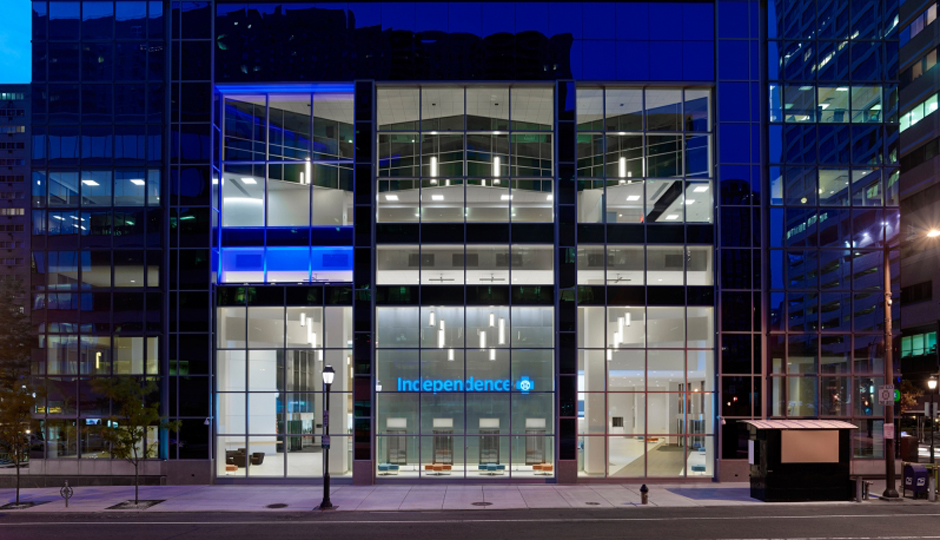Report: Independence Health Group Income Down 93 Percent

Independence Blue Cross HQ at 1901 Market Street.
As the wave of health care consolidation continues and the Affordable Care Act covers brings new entrants into the insurance market, a new report offers a glimpse into the financial standing of one of Philadelphia’s largest health care players.
Independence Health Group earned $6 million in net income during the first nine months of 2015 — but that’s down 93 percent from the same time period in 2014 when it earned $83 million. The numbers come from Fitch Ratings, which analyzed Blue Cross/Blue Shield companies across the country, finding that 23 out of 35 reported a decline in earnings.
Despite those figures, Independence Health Group (parent company of Independence Blue Cross) didn’t reported a net loss — even though 16 others did. Independence also saw nine-month revenues climb from $8.56 billion to $9.13 billion — a 6.7 percent increase.
When asked for comment, an Independence spokesperson said the company is currently finalizing its audited financial statement for 2015 and plans to announce the results in a few weeks.
Nationally, the aggregate net income of the 35 Blue Cross/Blue Shield companies studied by Fitch declined 52 percent compared with the prior year. One key challenge is the bulk in enrollment from state insurance exchanges as part of the rollout of the Affordable Care Act.
“Nonprofit Blues typically get a much larger percentage of their total enrollment than that added by publicly traded health insurers,” the report said. “Fitch believes that this strategy reflects the BCBS companies’ needs to protect their market share in, what for most companies, is the only state they operate in.”
As for IBX, “they seem to be falling in line with the others,” said Mark Rouck, senior director at Fitch. “Their capitalization and leverage metrics tend to be very good, but their financials tend to be not as good.”
“The reality is that these Blue companies are, for the most part, not-for-profit companies and have different motives,” Rouck continued. “In our mind, that’s probably a big contributor to why financial performance metrics don’t look at good as some of their publicly traded peers.”
The Fitch study comes at a time when Independence Health Group is reportedly exploring a merger or other strategic business options. The Wall Street Journal reported in mid-February that Independence held talks with “as many as 10 nonprofit Blue Cross and Blue Shield insurers” to discuss the possibility of “combining some operations to share costs or a fuller merger, among other options.” Citing a person familiar with the matter, the WSJ said that in the past “some nonprofit Blue Cross and Blue Shield insurers have combined or become for-profit and, ultimately, publicly traded.”
In response to the WSJ article, IBX said it is “committed to collaborating and partnering with other leaders in healthcare, including our fellow Blues” and will “continue to explore all possibilities that can improve the health and wellness of the members we serve.” It also said the “dynamic nature of today’s health care environment and the incredible opportunities to improve peoples’ lives require us to be increasingly innovative every day.”
Like what you’re reading? Stay in touch with BizPhilly — here’s how:
- Follow BizPhilly on Twitter
- Follow editor Jared Shelly
- Get the BizPhilly Newsletter
- Like BizPhilly on Facebook
- Check out the BizPhilly homepage


